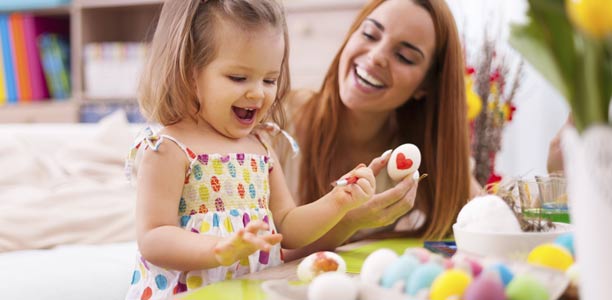There’s more to Easter than chocolate eggs. With all the evidence that kids should avoid sugary, fatty food, there’s plenty of reason to make the focus of your family’s Easter something other than chocolate.
Easter is traditionally a celebration of life and love. Regardless of your religious beliefs, Easter and the holidays that come with it are a great opportunity to focus on family life and inject a bit love into your relationships with your children. Showing kids your love is important but giving children opportunities to share their love, and other positive emotions like trust is also important.
Developing a strong emotional foundation
Emotional development is a key part of growing up and having supportive, loving relationships with special adults (in particular mums and dads but also others) is a prerequisite. Knowing that they are loved and safe in the wide world around them is an important foundation for children. It allows them to take control of their own emotions, overcome challenges they will undoubtedly face, and communicate and socialise effectively with the people they come across at school, during play, and later at work.
All parents want their kids to know they are loved and supported. The Easter long weekend provides what for many parents is probably a much needed break from work and a time to focus on family.
How can parents express their love?
Positive interaction
 Interacting positively with your kids is key. Positive interaction is very much about simple things like making eye contact when you’re talking to them, using their name and listening and answering when they speak (or make noises if they are a baby). When they’re in need, whether that’s because they’re hungry or they’ve fallen over and hurt themselves, respond to their needs consistently and lovingly. Your kids will feel loved and secure, and develop a sense of confidence in themselves.
Interacting positively with your kids is key. Positive interaction is very much about simple things like making eye contact when you’re talking to them, using their name and listening and answering when they speak (or make noises if they are a baby). When they’re in need, whether that’s because they’re hungry or they’ve fallen over and hurt themselves, respond to their needs consistently and lovingly. Your kids will feel loved and secure, and develop a sense of confidence in themselves.
Responding to children’s needs also involves guiding them, for example by explaining to them what they can and can’t do. As a general rule, focus on positives rather than negatives; that is telling them what you want them to do rather than what you don’t want them to do. For example at Easter, instead of saying “Don’t take all the treasures from the Easter hunt for yourself,” say, “Please share the treasures with the other children.” It’s also a good idea to ask them questions and let them choose, for example “You have found lots of treasures. Which ones would you like to share with the other children?”
Recognise and encourage the good things they do rather than focussing on responding to them when they’re naughty (called positive reinforcement). But rather than simply saying, “great job,” acknowledge the efforts that they’ve made and be specific about what it is that they’ve done well. For example say, “You’ve really worked hard to cut the Easter envelope so neatly,” or, “you’ve being sitting attentively listening to the Easter story. I’m really proud of you.”
Getting physically close to your kids is also an important part of developing relationships with them. You could try holding hands as you do an alternative Easter hunt. Using hugs, high fives and other similar physical reassurance to celebrate their achievements and good behaviours will also help them develop a secure, strong relationship with you. Building secure relationships with kids take a lot of love, but it should also involve lots of enjoyment and fun.
Fun and games
 Remember that having some fun is also a great way to learn. Take time out to play with your kids (whatever their age) and let them lead the games and activities. Be enthusiastic in your play; if you’re in public you might get a few strange looks for kidding around, but you will certainly have lots of fun. Double the positive impact of your playtime by showing your kids physical warmth, using positive comments and encouragement. While enjoying yourselves, you’ll be letting your child know that they’re loved and making your relationship stronger and more secure.
Remember that having some fun is also a great way to learn. Take time out to play with your kids (whatever their age) and let them lead the games and activities. Be enthusiastic in your play; if you’re in public you might get a few strange looks for kidding around, but you will certainly have lots of fun. Double the positive impact of your playtime by showing your kids physical warmth, using positive comments and encouragement. While enjoying yourselves, you’ll be letting your child know that they’re loved and making your relationship stronger and more secure.
Providing children opportunities to have fun and share love with other children is also important. For babies this may simply mean holding them up so they can see and touch another baby. Once they start running around, provide fun environments for kids to interact in together. You might take them to a park with play equipment, but Easter provides special opportunities to have fun at home. A game of Easter Bunny hide and seek is a great way to burn off energy, or if you need something a bit more relaxed (or to do inside while it’s raining) help the kids have fun by painting Easter eggs or doing Easter educational worksheets.
Let them express their love
 Letting them express their love when they’re little is also an important way to help kids grow into sharing and caring adults. Children are naturally empathetic, so for parents it’s a matter of providing them opportunities to give, share and be kind and compassionate to others.
Letting them express their love when they’re little is also an important way to help kids grow into sharing and caring adults. Children are naturally empathetic, so for parents it’s a matter of providing them opportunities to give, share and be kind and compassionate to others.
At Easter there are plenty of opportunities to share and care. For example, you could help them make Easter egg cards with special messages to give to loved ones or help them share around the treasures they find on an alternative Easter hunt. If you’ve got time to spare over the Easter long weekend, why not do a good deed like visit someone who might be all alone or help the elderly couple down the road with their gardening.
For more information see how to have sharing and caring kids.
Make Easter a positive celebration of life and love
However you decide to celebrate Easter, make the most of the opportunity to help your children develop the social and emotional foundation they’ll need to go forward in life with confidence and to love themselves and others. Rather than filling their bellies with chocolates, fill their minds with compassion and their hearts with love.
References
- Durden T, Making it happen: Building Positive Relationships with Children. University of Nebraska. 2013 (cited 23 March 2014). Available from: (URL Link)
- Joseph GE, Strain PS. Building Positive Relationships with Young Children. Vandebuilt University- The Centre for the Social and Emotional Foundations for Early Learning. (cited 25 March 2014). Available from: (URL Link)
- Women Give 2013- New Research on Charitable Giving by Girls and Boys. Lilly Family School of Philanthropy. Indiana University. Women’s Philanthropy Institute. 2013 (cited 1 April 2014). Available from: (URL Link)



 (9 votes, average: 4.44 out of 5)
(9 votes, average: 4.44 out of 5) 






